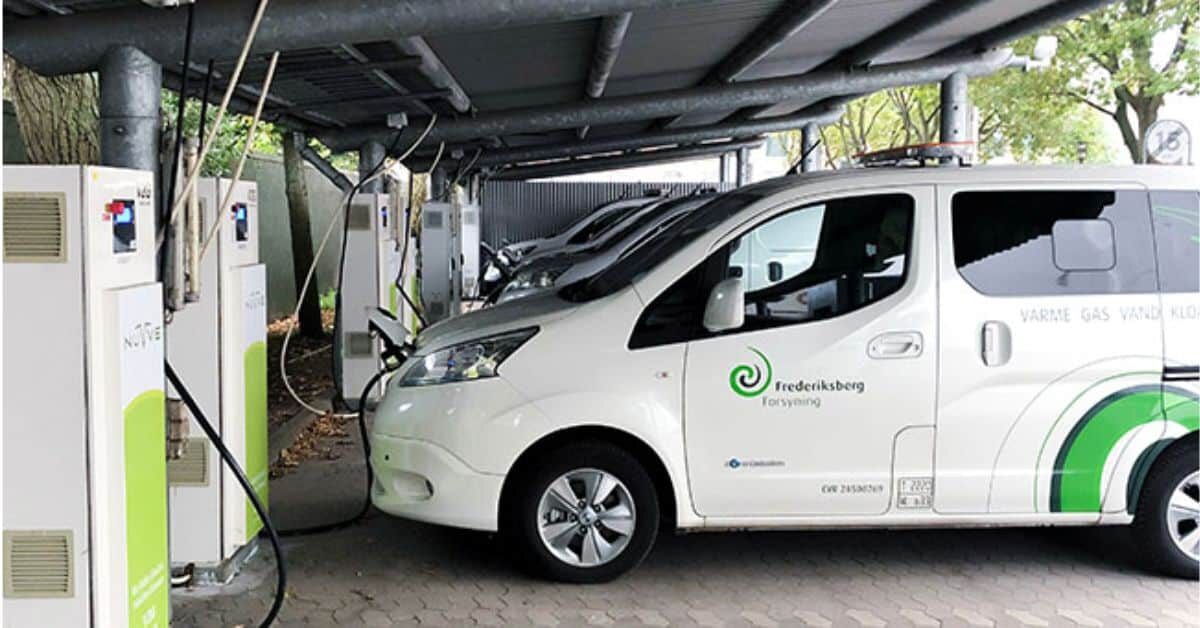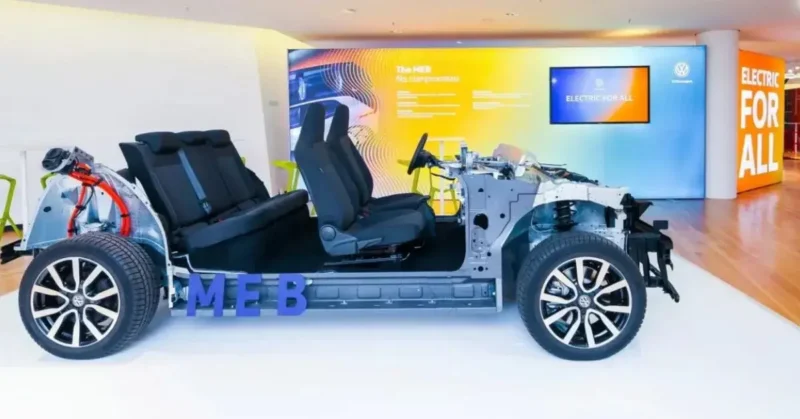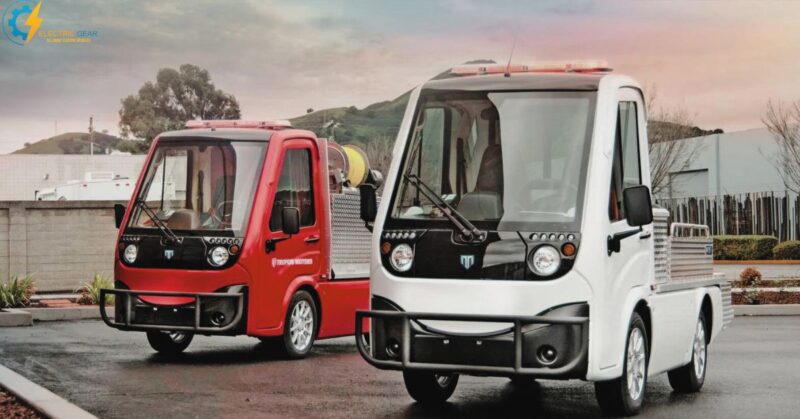Electric vehicles are becoming a more effective and standard mode of transportation as the world is becoming more ecologically conscious. Electric fleet cars are essential to this transition because they provide a sustainable and practical choice for businesses and organizations.
The advantages of electric fleet cars, their underlying technology, and how they are positioned to transform transportation will all be covered in this article in detail.
What Are Electric Fleet Vehicles?
Electric fleet vehicles, such as delivery vans, buses, and trucks, are commercially utilized electric vehicles. Typically, they are utilized by businesses and organizations that require daily transportation of products or people, such as logistics corporations, governments, and public transit agencies.

Electric fleet cars are comparable in size and capability to conventional gasoline-powered fleet vehicles, but they are fueled by electricity rather than gasoline or diesel.
The Advantages of Electric Fleet Vehicles for Businesses
Electric fleet vehicles offer numerous advantages for businesses, including:
Lower Operating Costs
Electric vehicles have lower operating costs than traditional gasoline or diesel vehicles. They require less maintenance, lower fuel costs, and fewer moving parts, resulting in fewer repairs and less downtime.
Reduced Environmental Impact
Electric fleet vehicles produce zero tailpipe emissions, so they don’t contribute to air pollution. It is essential for businesses operating in areas with strict emissions regulations.
Improved Corporate Social Responsibility
Switching to an electric fleet can help businesses improve their corporate social responsibility profile, showing customers, employees, and investors that they are committed to reducing their carbon footprint.
Enhanced Public Image
Operating an electric fleet can help businesses enhance their image and reputation as environmentally conscious companies. This can attract and retain customers and employees who value sustainability.
Increased Fuel Independence
Electric vehicles are powered by electricity, which can be generated from various sources, including renewable energy. It means businesses can reduce their dependence on fossil fuels and achieve greater energy independence.
Government Incentives
Many governments offer incentives, such as tax credits, rebates, and grants, to businesses that purchase electric fleet vehicles. These incentives help reduce the upfront costs of purchasing electric vehicles.
Electric fleet vehicles offer several advantages for businesses looking to reduce costs, improve their environmental impact, and enhance their corporate social responsibility profile.
Electric Fleet Vehicle Technology
In recent years, electric fleet vehicle technology has advanced significantly. Modern electric cars power their electric motors using cutting-edge battery technology.
While lithium-ion batteries presently make up the majority of batteries used in electric vehicles, new battery technologies are being explored, that might enhance the efficiency and range of these vehicles even further.
The infrastructure for charging commercial electric cars is also crucial. Businesses and organizations that deploy electric vehicles will require access to charging stations to guarantee that their fleet cars can be charged quickly and effectively.
Luckily, public charging stations for electric cars are becoming increasingly common, and charging infrastructure is spreading.
Government Incentives and Policies to Promote Electric Fleet Adoption
Governments all around the globe are enacting rules and providing incentives to encourage the use of electric vehicles (EVs) and the transition to a greener transportation future.
These policies include tax subsidies and rebates for EV sales, grants for building charging infrastructure, and mandates that manufacturers produce a specific number of electric cars.
Governments also provide incentives for fleet operators to migrate to EVs, such as vehicle purchase subsidies, access to carpool lanes, and exemptions from tolls and congestion charges.
These programs attempt to decrease greenhouse gas emissions, improve air quality, and make transportation more sustainable.
Maintenance and Servicing of Electric Fleet Vehicles
Electric fleet vehicles require proper maintenance and servicing for their longevity and efficiency. Here are some best practices for maintaining and servicing electric fleet vehicles:
Monitor tire pressure and tread
Properly inflated tires and good tread can improve fuel efficiency and extend tire life.
Inspect and replace brake pads
Electric vehicles rely on regenerative braking, which can prolong the life of brake pads. However, it is essential to regularly inspect and replace brake pads as needed to ensure safe operation.
Future Trends and Innovations in Electric Fleet Vehicles
The usage of electric fleet vehicles is projected to increase dramatically in the future years as the globe moves towards more ecological means of transportation. Some of the most exciting developments and trends in electric fleet vehicles are as follows:
Increased Range
One significant improvement to electric fleet vehicles is an increased range, making them more suited for long-distance travel.
Faster Charging
The time it takes to charge an electric car is a significant cause for worry. Faster charging technology, however, is anticipated to make commercial electric cars more practical.
Vehicle-to-Grid (V2G) Technology
V2G technology allows electric vehicles to feed power back into the grid when unused. This can help balance the electricity demand and supply and reduce the strain on the grid.
Autonomous Driving
Electric fleet vehicles equipped with autonomous driving technology can help reduce accidents and improve efficiency, making them more attractive for fleet operators.
Innovative Battery Technology
The development of new battery technologies, such as solid-state batteries, is likely to improve the performance and range of electric fleet vehicles, thus, making them more competitive with traditional gasoline vehicles.
Overall, the outlook for electric fleet vehicles is positive, and substantial technological and infrastructural developments are on the way.
Electric Vehicle Fleet Charging Infrastructure
Charging infrastructure for electric vehicle fleets is the charging station system and other components required to operate an electric car fleet. Public charging stations and stations placed at central depots or offices are also possible components of this system.
Having a charging infrastructure that is enough for a fleet of electric vehicles. It pertains to both the available charging stations and their total capacity.
The fleet size, the average distance driven by vehicles, and the charging needs of individual cars are all considerations for fleet managers.
Fleet managers must consider the software and data management systems required to monitor and control the charging process and the physical charging infrastructure.
To improve fleet operations and reduce unavailability, this may include systems for monitoring charging consumption and expenses and scheduling charging activities.
A more sustainable transportation system that reduces emissions relies on a robust charging infrastructure for electric car fleets.
The Future of Electric Fleet Vehicles
Businesses and organizations that depend on transportation have reason to be optimistic about the future of transportation: electric fleet cars. Electric cars’ efficiency, range, and charging times will increase as battery technology advances.
In addition, the general availability of charging stations will increase as more companies and organizations embrace electric vehicles, increasing the need for charging infrastructure.
Yet, there are challenges to be conquered in the migration to electric fleet vehicles. While the difference between the prices of electric and gas-powered vehicles is likely to shrink as the technology becomes more widespread, electric vehicles currently have a higher starting price.
Organizations that need to carry products or people over long distances may also be concerned about the restricted range of electric cars compared to gas-powered vehicles.
Conclusion
Companies and organizations that depend on transportation may benefit from electric fleet vehicles since they are efficient and environmentally friendly.
Electric fleet vehicles are rising in popularity because of their many advantages, including less environmental impact, cheaper running costs, higher performance, and adherence to regulations.
Electric fleet cars will become increasingly commonplace as charging stations become more widely available and technology advances.
Frequently Asked Questions
Are electric fleet vehicles more expensive than traditional vehicles?
Electric fleet vehicles may cost more to buy at first, but they save money in the long run because they are cheaper to run and maintain. Also, government incentives can help pay for the initial costs, making them a financially sound choice.
How long does it take to charge an electric fleet vehicle?
The amount of time it takes to charge an electric fleet vehicle depends on several things, such as the battery’s capacity and how much power the charging station puts out. Fast-charging technologies can cut charging times by a lot. Some vehicles can get 80% charged in less than an hour.
What are the main challenges of adopting electric fleet vehicles?
Range anxiety, a lack of charging stations, and switching from internal combustion engines are the main problems with electric fleet vehicles. But these problems can be solved with better-charging infrastructure, more advanced battery technology, and careful planning.
Can electric fleet vehicles operate in extreme weather conditions?
Electric fleet vehicles are made to work in many different kinds of weather. But extreme temperatures can change how far the vehicles can go and how well they work. The goal of continuing to improve battery technology is to lessen these effects and make sure that batteries work well in all kinds of weather.
Are there any tax benefits for companies using electric fleet vehicles?
As part of their efforts to be more environmentally friendly, many countries offer tax breaks, credits, and other incentives to companies that use electric fleet vehicles. Some of these benefits are tax credits, grants, and exemptions, all of which can make buying and running electric fleet vehicles much cheaper overall.

Imran is an experienced content writer who crafts engaging and informative articles for a variety of industries. With a keen eye for detail and a passion for storytelling, Imran delivers high-quality content that resonates with readers. Whether he’s writing blog posts, social media content, or website copy, Imran is committed to delivering compelling content that drives results.







